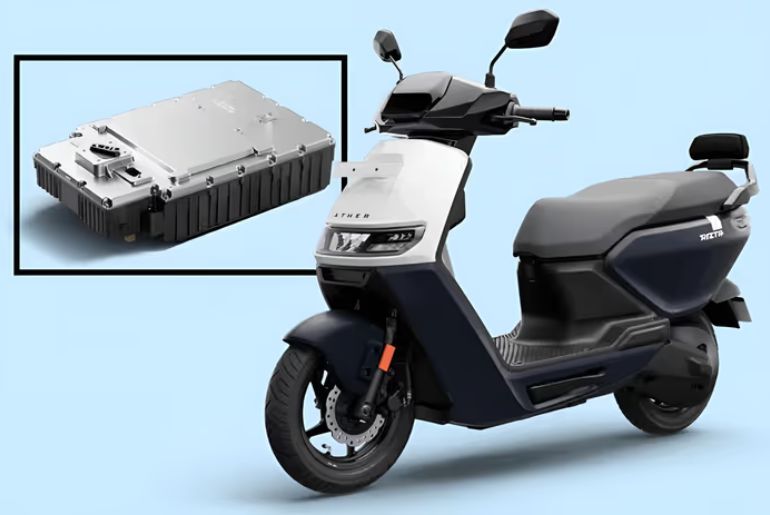In addition to creating quick charging technology and an inexpensive scooter platform, Ather reveals it intends to increase its stores to over 750 this year.
In order to increase competitiveness with companies such as TVS, Bajaj, and Ola Electric, Ather Energy plans to introduce a Battery-as-a-Service (BaaS) model. The concept was confirmed by Chief Business Officer Ravneet Phokela.
Ather’s upcoming model
The company’s most affordable Rizta S model is currently on sale for Rs 1 lakh
By decoupling battery ownership from vehicle ownership, the Battery-as-a-Service (BaaS) business model seeks to lower the cost of electric vehicles and make them more competitive with internal combustion engine (ICE) models. Customers of the model pay for battery usage either on a subscription basis or per kilometre. Since the battery makes up 30–40% of an electric vehicle’s cost, this lowers the initial outlay of funds.
“Our research shows that the market has a natural inclination to purchase EVs. While some customers struggle with the initial cost of buying, others recognise the advantages of total cost of ownership. We think [BaaS] can overcome that obstacle,” Phokela stated. Ravneet Phokela did not, however, provide a specific date for the company’s BaaS model debut. According to sources, an announcement is anticipated within a week.
Hero MotoCorp, the biggest shareholder in Ather Energy, has also declared that it will begin using the BaaS model for its next Vida VX2 electric scooter on July 1. Ather Energy’s intentions for BaaS coincide with the development of its product line, retail network, and technology. The business plans to launch a new platform for reasonably priced electric scooters and next-generation rapid charging technologies in addition to expanding its retail locations.
The carmaker has stated that it will increase the number of its retail locations from the current 350 to over 750 by the end of the year. The approach emphasises density by adding outlets in high-volume metro areas, where half of its stores generate 70% of sales, and reach by expanding into new cities, particularly in North India.
According to a recent announcement from the corporation, an event in August would feature the new “EL” platform and concept cars. Additionally, it intends to introduce Ather Stack 7.0, an updated version of its software stack, and next-generation fast chargers. According to the business, “The new fast charging solution will make charging quicker and more convenient, while the new EL platform, designed to be versatile and cost-efficient, will enable Ather to expand its product lineup to cater to a wider range of customer needs.”
Competitors have launched models with aggressive pricing to boost sales, but Ather has resisted the urge to enter the low-cost, under Rs 1 lakh market. Family-friendly Rizta scooters start at Rs 1.1 lakh, while the company’s flagship 450 model costs between Rs 1.2 and Rs 1.9 lakh.
Ather Energy plans to step up its competition in order to gain a bigger portion of the electric two-wheeler industry. Plans to launch the BaaS model, a new, reasonably priced scooter, cutting-edge fast-charging technology, and an ambitious objective to quadruple its retail footprint to over 750 locations using a 1:1 sales-to-service centre model are what are driving this effort.
These actions specifically target established legacy manufacturers’ substantial retail advantage and devoted customer base, as well as Ola Electric’s robust market volume, which is attained through affordable models.

